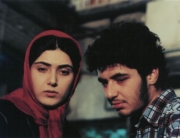Filipino filmmaker Lino Brocka’s restored 1980 drama, which premiered last spring at Cannes, is a blunt study of the effects of abuse on a teenager: Bona (Nora Aunor), who has endured a vicious cycle of domestic violence at the hands of her physically and emotionally abusive father. Smart and levelheaded, Bona has nevertheless internalized her oppressive existence so deeply that she begins an equally unbalanced relationship with Gardo (Phillip Salvador), a handsome bit player in locally made action movies whom she obsesses over.
Bona and Gardo soon set up housekeeping in his tiny home, where she replicates the submissive role her mother (Rustica Carpio) played in her father’s life. Without complaint, she cooks, cleans, sews his clothes, and occasionally has sex with Gardo. He, in turn, has no qualms about treating Bona as merely his kept woman. He lords his power over her, confident she will capitulate to his every demand—whether it’s preparing a hot meal, tolerating other women in the house, or, in the most unsettling sequence, assisting him in arranging an abortion for a young woman he has impregnated. When the trio visits the doctor’s office for the procedure, Gardo casually inquires about the cost, and the doctor replies: “150 pesos, same as before.”
Brocka’s sharp eye is evident from the film’s opening. Bona begins with a robust crowd of religious devotees gathered on the streets of Manila for a procession featuring a large cross and a statue of Mary. Brocka cuts to a close-up of Bona, her face beaming with adulation as the statues pass by—mirroring the same devotion she later directs toward Gardo. The film is a prime example of Filipino neorealism: Brocka shot portions of it in a slum near Manila, and his gritty, handheld style vividly reflects the rundown world of its characters.
Eventually, Gardo realizes he is stuck in a rut of minor film roles with little chance of achieving stardom. When he tells Bona he’s thinking of leaving the movie business and moving away from their small town, it becomes clear once again how little he cares about her plight. To him, she remains nothing more than a maid, cook, cleaning woman, and occasional sexual partner.
In response, Bona—who has just returned from visiting her family homestead, where she was shunned by an older brother whose temper mirrors her father’s—faces the crushing realization that she has nowhere else to go. Her reaction to Gardo’s news is far from the quiet acceptance she has displayed earlier. It’s a cathartic moment that Brocka plays to full effect, capturing Aunor’s masterful portrayal of the eponymous heroine in a performance that is often frightening in its quiet but palpable intensity.
While Bona can be read as a cautionary tale about the dangers of idolatry during the Marcos regime (when the film was made), it transcends its political context. The film is a timeless exploration of the perils of blind adherence to dogma—whether religious or the cult of celebrity.

















Leave A Comment